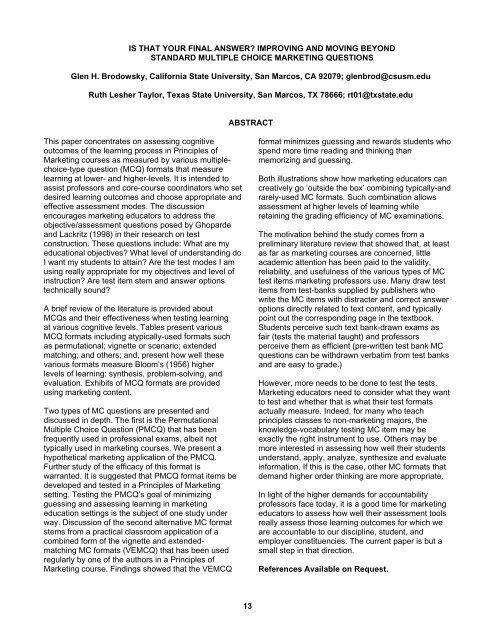2008 - Marketing Educators' Association
2008 - Marketing Educators' Association
2008 - Marketing Educators' Association
You also want an ePaper? Increase the reach of your titles
YUMPU automatically turns print PDFs into web optimized ePapers that Google loves.
IS THAT YOUR FINAL ANSWER? IMPROVING AND MOVING BEYOND<br />
STANDARD MULTIPLE CHOICE MARKETING QUESTIONS<br />
Glen H. Brodowsky, California State University, San Marcos, CA 92079; glenbrod@csusm.edu<br />
Ruth Lesher Taylor, Texas State University, San Marcos, TX 78666; rt01@txstate.edu<br />
This paper concentrates on assessing cognitive<br />
outcomes of the learning process in Principles of<br />
<strong>Marketing</strong> courses as measured by various multiplechoice-type<br />
question (MCQ) formats that measure<br />
learning at lower- and higher-levels. It is intended to<br />
assist professors and core-course coordinators who set<br />
desired learning outcomes and choose appropriate and<br />
effective assessment modes. The discussion<br />
encourages marketing educators to address the<br />
objective/assessment questions posed by Ghoparde<br />
and Lackritz (1998) in their research on test<br />
construction. These questions include: What are my<br />
educational objectives? What level of understanding do<br />
I want my students to attain? Are the test modes I am<br />
using really appropriate for my objectives and level of<br />
instruction? Are test item stem and answer options<br />
technically sound?<br />
A brief review of the literature is provided about<br />
MCQs and their effectiveness when testing learning<br />
at various cognitive levels. Tables present various<br />
MCQ formats including atypically-used formats such<br />
as permutational; vignette or scenario; extended<br />
matching; and others; and, present how well these<br />
various formats measure Bloom’s (1956) higher<br />
levels of learning: synthesis, problem-solving, and<br />
evaluation. Exhibits of MCQ formats are provided<br />
using marketing content.<br />
Two types of MC questions are presented and<br />
discussed in depth. The first is the Permutational<br />
Multiple Choice Question (PMCQ) that has been<br />
frequently used in professional exams, albeit not<br />
typically used in marketing courses. We present a<br />
hypothetical marketing application of the PMCQ.<br />
Further study of the efficacy of this format is<br />
warranted. It is suggested that PMCQ format items be<br />
developed and tested in a Principles of <strong>Marketing</strong><br />
setting. Testing the PMCQ’s goal of minimizing<br />
guessing and assessing learning in marketing<br />
education settings is the subject of one study under<br />
way. Discussion of the second alternative MC format<br />
stems from a practical classroom application of a<br />
combined form of the vignette and extendedmatching<br />
MC formats (VEMCQ) that has been used<br />
regularly by one of the authors in a Principles of<br />
<strong>Marketing</strong> course. Findings showed that the VEMCQ<br />
ABSTRACT<br />
13<br />
format minimizes guessing and rewards students who<br />
spend more time reading and thinking than<br />
memorizing and guessing.<br />
Both illustrations show how marketing educators can<br />
creatively go ‘outside the box’ combining typically-and<br />
rarely-used MC formats. Such combination allows<br />
assessment at higher levels of learning while<br />
retaining the grading efficiency of MC examinations.<br />
The motivation behind the study comes from a<br />
preliminary literature review that showed that, at least<br />
as far as marketing courses are concerned, little<br />
academic attention has been paid to the validity,<br />
reliability, and usefulness of the various types of MC<br />
test items marketing professors use. Many draw test<br />
items from test-banks supplied by publishers who<br />
write the MC items with distracter and correct answer<br />
options directly related to text content, and typically<br />
point out the corresponding page in the textbook.<br />
Students perceive such text bank-drawn exams as<br />
fair (tests the material taught) and professors<br />
perceive them as efficient (pre-written test bank MC<br />
questions can be withdrawn verbatim from test banks<br />
and are easy to grade.)<br />
However, more needs to be done to test the tests.<br />
<strong>Marketing</strong> educators need to consider what they want<br />
to test and whether that is what their test formats<br />
actually measure. Indeed, for many who teach<br />
principles classes to non-marketing majors, the<br />
knowledge-vocabulary testing MC item may be<br />
exactly the right instrument to use. Others may be<br />
more interested in assessing how well their students<br />
understand, apply, analyze, synthesize and evaluate<br />
information. If this is the case, other MC formats that<br />
demand higher order thinking are more appropriate.<br />
In light of the higher demands for accountability<br />
professors face today, it is a good time for marketing<br />
educators to assess how well their assessment tools<br />
really assess those learning outcomes for which we<br />
are accountable to our discipline, student, and<br />
employer constituencies. The current paper is but a<br />
small step in that direction.<br />
References Available on Request.


